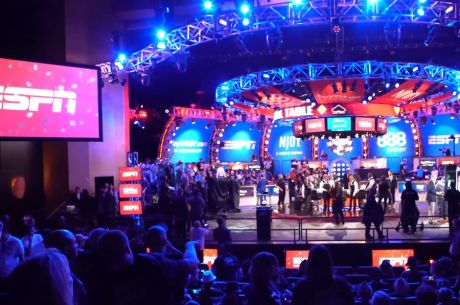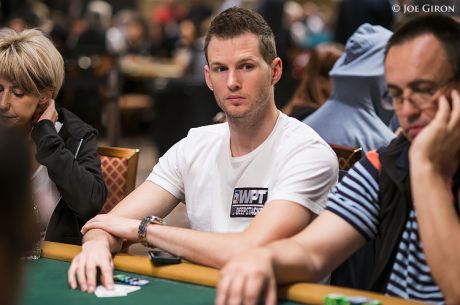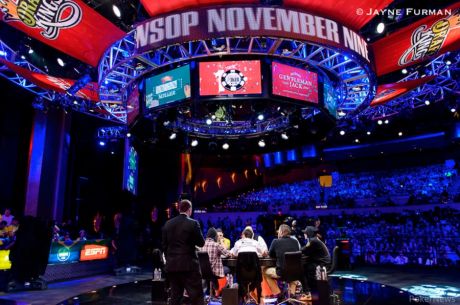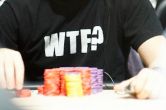Think You��re ��Due�� to Flop a Set This Time? Think Again
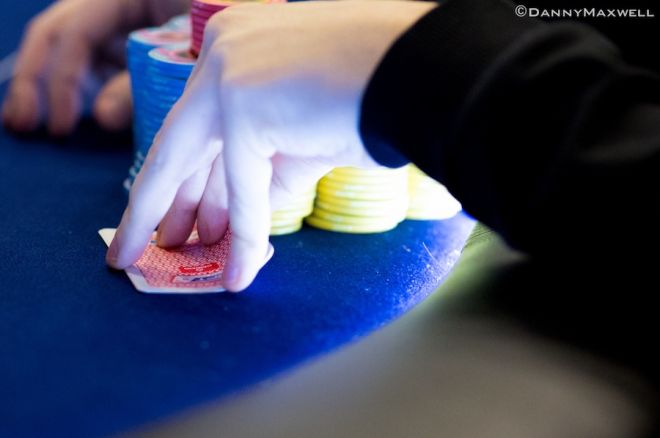
Last week I wrote about the ��lumpy�� nature of luck �� that is, how during long strings of results from random trials, you��ll typically find that the outcomes do not distribute evenly, as our intuition tells us they should. I ran out of space before I could get to another poker-related implication of this phenomenon: the idea of something being ��due.��
If you eavesdrop on strangers�� conversations on the gaming floor of a casino, you can hear that word, or the same idea expressed in different words, quite frequently. ��This roulette wheel has hit red six times in a row, so black is due.�� ��This shooter has made his point eight times straight. He��s bound to miss this time, so I��m betting against him.��
It takes only a little thought to realize that this is exactly equivalent to the example I used in my previous article about a group of students assigned to try to simulate the results of a series of coin tosses. After about five consecutive ��heads,�� they feel a strong urge to restore a feeling of balance to the count by making the next outcome a ��tails.�� An actual coin, however, has no such bias, and is exactly as likely to add a sixth ��heads�� as to come up ��tails.��
Similarly, the roulette wheel has no memory for where the ball has previously landed. No matter how many reds, blacks, evens, or odds have consecutively come before, the odds for the outcome of the next spin remain exactly the same.
Our difficulty grasping this aspect of randomness is so pervasive in games of chance that it is known simply as ��the gambler��s fallacy.�� We refuse to believe, deep down, that the next roll of the dice, spin of the wheel, or shuffle of the deck is genuinely independent of those that came before. As a result, we think certain events become more likely when they have not happened in a while �� they are due.
As applied to poker, this idea is more often thought privately than expressed openly. I haven��t flopped a set from a pocket pair in weeks, so I��m definitely due. I haven��t completed the last ten flush draws I��ve chased, so this one is sure to come.
Such thinking is completely fallacious. If you find thoughts like that pushing you to take an action you otherwise wouldn��t, feel free to give yourself a dope slap, right there at the poker table, if that��s what it takes to get your head straight.
There are no unseen beings keeping track of your bad streak and intervening to inject some good luck to restore balance. The probability of flopping a third card to match the pair in your hand remains 11.8% every time, even if you��ve hit it ten times in a row, and even if you��ve missed it a hundred times in a row. The cards have no memory. They do not care about treating you fairly or making things come out evenly.
Jackpots and Judgments
One aspect of the game where poker players do commonly speak openly about something being ��due�� is jackpots �� especially bad-beat jackpots.
Most poker rooms that have progressive BBJs prominently post the jackpot amount, and sooner or later the talk at the table becomes how it is ��due�� to hit. The flawed thinking underlying this is just one particular form of the gambler��s fallacy. We tend to believe that a rare event becomes more likely after a long spell when it has not happened. That is an impossibility when each trial �� in this case, each shuffle of a deck of cards �� is fully independent of those that went before.
Here, however, there is an element of truth to the concept �� but it has nothing to do with the nature of randomness or the lumpiness of luck, and everything to do with how these erroneous judgments introduce changes in players�� behavior.
Even if no qualifying hand (e.g., quads losing to a straight flush) has occurred in the last billion hands dealt in a poker room, the probability of the deck being shuffled into an arrangement where that can happen remains precisely the same every hand. However, as the jackpot grows larger, players respond in ways that increase the chance that the BBJ will be hit in any given hour or day.
First, they tend to start playing more and longer sessions in the room with the big jackpot pending. More players means more hands being dealt, which translates into more opportunities for the desired kind of hand to happen. (Attracting more players is, of course, exactly why the casinos sponsor such promotions.)
Second, players shift which games they play. For example, the lowest-stakes limit hold��em games suddenly become more popular than ever, because players want to get hands to the river as cheaply as possible while trying to make a qualifying hand.
Third, they change how they play, holding on to pairs and suited connectors and gappers more tenaciously than usual.
All of this does, in fact, increase the probability of a BBJ hitting on a given day well above the baseline probability. But again, this effect is entirely the result of changed player choices �� it is not the case that the decks of cards become more likely to be shuffled into a favorable order because a quads-versus-straight flush confrontation is statistically ��due.�� The probability of such a arrangement of the deck occurring is precisely the same on the very next hand after a BBJ was claimed as it was on the hand before it.
The Wrong Side of the Law of Averages
The last aspect of poker in which players tend to speak of something being ��due�� pertains to personal winning and losing streaks.
A friend of mine, and a fellow poker blogger, frequently writes things like, ��I��ve been really lucky lately, so I��m due for a big loss.�� He has done this for many years, oblivious to my attempts, and the efforts of others, to convince him that this is fallacious.
Now, to be fair, using ��due�� in this situation is not quite the same as when we��re talking about outcomes of purely random, independent events like spins of a roulette wheel or flush draws becoming flushes. That��s because whether a person wins or loses in a session of poker, or any other form of gambling, is not a purely random phenomenon. Obviously chance plays a large role, but the outcome is also influenced by how well you play, how well others play, and your choice to leave or keep playing at various points when you consider that decision.
Even so, it is conceptually wrong to believe that a loss is ��due�� after a streak of wins, or vice-versa, because of something intrinsic to the mathematics of probability, or in how the universe runs. If your long-term results are that you win in about 75% of your poker sessions and lose in about 25%, then that remains a rough predictor of the outcome of any individual session, even if you have had ten wins in a row, or ten losses in a row.
Again, we can��t say this with the same kind of statistical rigor as with purely random events, but it��s still a general truth. Nothing about the ��law of averages�� dictates that a losing session becomes more likely after a long string of wins. Frankly, if you think it does, you don��t understand probability well enough to expect to be a winning poker player.
What��s worse is that a belief in a loss being ��due�� is potentially dangerous to your bankroll. If you believe that you are ��due�� to lose, you actually can make it more likely to happen by subtle degradation in the quality of your decisions. For example, you make a bad call that in other circumstances you wouldn��t, or chase a draw without sufficient implied odds to do so, or loosen your starting-hand standards. Because you have decided in advance that you��re going to lose, you sabotage your game, subconsciously seeking to prove yourself right.
Conclusion
We want things to be even. Moreover, we expect them to be even, or, at most, just a little uneven. Such expectations do not reflect the reality of randomness. No outcome is ��due�� because it has not happened in the span of time you think it should.
Purge such ideas from your thinking; they are wrong and poisonous. Accept how randomness actually works, which, to repeat, is this �� the outcome of the next event does not change because of what happened before.
Robert Woolley lives in Asheville, NC. He spent several years in Las Vegas and chronicled his life in poker on the ��Poker Grump�� blog.
Want to stay atop all the latest in the poker world? If so, make sure to get PokerNews updates on your social media outlets. Follow us on Twitter and find us on both Facebook and Google+!

